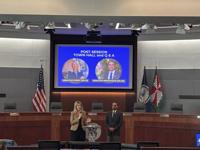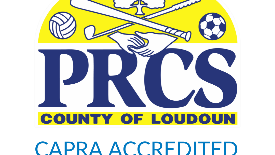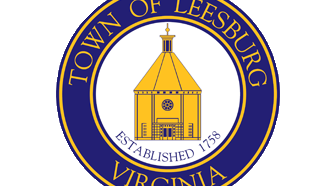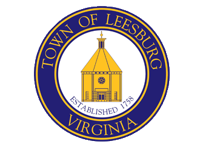Monday marked the deadline for Gov. Glenn Youngkin to take action on the 916 bills sent to him by the General Assembly this year. Of those, 30 sponsored by Loudoun’s legislators will become law, while 12 will advance back the House and Senate for further review and 11 received a veto.
Many of the 30 signed received bipartisan support from delegates and senators during the session.
Sen. Russet Perry (D-31) had 10 pieces of legislation signed by the governor relating to lease agreements, controlled substances, the courts systems and health insurance.
Two of her bills were vetoed – one that would add a person’s intimate partner to the definition of family or household member when dealing with the prohibition of purchasing a firearm by a person who has been convicted of misdemeanor assault and battery and a second that redefines trigger activator in the state code when referring to the penalty associated with the device used to alter the rate of fire of a semi-automatic weapon to mimic automatic weapon fire. That definition includes a bump stock, trigger crank, hellfire trigger, binary trigger system and burst trigger system.
Youngkin said he had reviewed a bill identical to SB883 last year and said that domestic abusers should be “dealt with appropriately.” However, Virginia already has mechanism for disarming dangerous individuals, he said.
“This proposal, however, aims to extend the prohibition of firearm possession for misdemeanors beyond existing restrictions for family and household members. It would now encompass a vaguely defined category of intimate partners without an objective standard,” he stated.
In addition, changing the definition of “household member” would have far reaching effects beyond this law, he said.
Regarding SB886, Youngkin said existing legislation also addressed trigger activators.
“Terms used in the bill capture commonly used modifications for firearms that civilians regularly use that do not turn semi-automatic firearms into fully automatic firearms,” he stated.
The two pieces of legislation that received amendments from the governor related to personal injury liability and stormwater management.
SB894 would stipulate that if a vulnerable victim brings a personal injury or wrongful death action against an employee, the employer can be found vicariously liable for that action if several factors are met including failure to exercise reasonable care over the employee.
Youngkin’s recommendation narrows the scope of the change to employer liability for criminal sexual assault, abuse of a child, or malicious wounding.
SB1093 would remove the restriction on localities that operate separate storm sewer systems to only enter those properties if a discharge enters the system and allows them access under reasonable circumstances.
Youngkin’s language keeps the changes from going into effect until reenacted during the 2026 General Assembly session. Del. Marty Martinez (D-29) introduced a House version of the bill that was also amended by the governor.
A bill by Martinez (D-29) that made a minor change to State Code referring to Uniform Trust Code by adding electronic defined as “relating to technology having electrical, digital, magnetic, wireless, optical, electromagnetic, or similar capabilities” was signed by the governor.
However, his bills that would give towns a portion of the plastic bag tax collected by the county and one that allows parents to inform schools about a student’s planned absence of 15 or more days and keep that from counting toward a school’s accreditation assessment were vetoed by Youngkin.
A fifth bill by Martinez that would expand the parameters for unemployment benefits was amended by Youngkin.
Of the seven bills that advanced to Youngkin’s desk by Del. David Reid (D-28) four were signed, two amended and one vetoed.
The four that were approved changed language in the Commercial Property Assessed Clean Energy financing program, adds the Randolph-Macon Academy to the list of educational institutions where officers may be commissioned officers of the Virginia state militia, evaluates the need for public safety communication infrastructure needs and their costs and encourages the use of advanced conductor materials in high voltage transmission lines.
Younkgin vetoed the bill that would have created a lower, separate classification of tangible personal property for electric-powered landscaping equipment. He said bill did not take into account additional costs that landscaping companies would need to incur to use battery-powered equipment.
“It does not take into account landscaping companies who may benefit from the lowered property tax but cannot afford to replace their current equipment,” he stated.
The governor sent back recommendations on Reid’s bill that would allow large energy consumers to claim credit under the Accelerated Renewable Buyers Program by using battery energy storage systems and allow African American History to take the place of a U.S. History while meeting graduation requirements if desired.
Sen. Kannan Srinivasan (D-32) had four bills signed by the governor regarding gun safes, hospital and nursing home license fees, the Commission on Early Childhood Care and Education and certifying and licensing midwives.
His bills that would have required more information from transportation companies in the form of annual reports on passenger data to the Department of Motor Vehicles and food allergy notices at restaurants were vetoed.
Youngkin said mandating disclosures and reports would create administrative burdens for the private companies.
“Entangling the Department of Motor Vehicles with overseeing private business data is unwarranted and overreaching. Private businesses should not be forced to disclose data through government mandates but should do so voluntarily based on industry best practices,” according to the governor’s explanation.
Del. JJ Singh (D-26) had an identical House bill that was also vetoed.
Younkgin said the allergy notice bill placed an “undue burden” on restaurant owners and staff and overlapped with already existing laws that require food establishments to have a certified food protection manager who is responsible for food safety, which includes food allergy awareness.
Three additional bills by Srinivasan were sent back to the General Assembly with recommended changes. Those included prohibiting a dormancy fee on gift cards, allowing students to receive telehealth counseling from school counselors and amending the Virginia Residential Landlord and Tenant Act.
Four Singh’s bills received approval from the governor regarding gun safe tax credits, property sales during divorce proceedings, behavioral health services at correctional facilities and parental notification of overdoses on school grounds.
Two of his bills that would have added to the list of categories that the state Library Board awards the patron of letters honorary degree and that required the Department of Criminal Justice Services to establish statewide best practices received recommended changes.
Del. Atoosa Reaser (D-27) had 11 bills advance to the governor’s desk. Seven received approval across a variety of topics including telehealth, student literary instruction, student health and safety and professional and occupational regulation and the Virginia Values Veterans Program.
Bills that would have given some localities the authority to negotiate for affordable housing during special exception applications; allowed the governing body, in addition to the Electoral Board, the ability to set the dates and hours of operation at absentee voting sites; and clarifies State Code from allowing both the school division and teachers to provide written discontinuation of contract by June 15 each year to just the teacher being able to end the contract in writing were vetoed.
Reaser said in a statement to Loudoun Now that she plans to reintroduce the bill regarding senior housing affordability next session and plans to work with the new governor to pass it. She also plans to reintroduce the bill that allows governing bodies to set early voting.
“I am incredibly humbled to be able to continue my public service representing Loudoun and am grateful for successfully passing over a dozen pieces of legislation during my first term. I look forward to earning a re-election win in November so I can continue to champion our community’s needs,” Reaser said.
Youngkin called the contract notification bill a “solution in search of a problem.”
“There is no widespread issue necessitating this statutory change, and no evidence suggests that the current process is flawed,” he stated.
Younkgin proposed amendments to Reaser’s bill that required the Department of Education to create an index that chronicles all trainings teachers have received in an easily accessible public format and on its website. The change would push the deadline from August to November.
The General Assembly will reconvene for a single day April 1 to consider final actions on the amended bills.
Edited March 28, 2025 at 11:23 a.m. to add comments from Reaser and March 31 at 3:54 p.m. to correct language around Reaser's proposed absentee voting bill.






















(0) comments
Welcome to the discussion.
Log In
Keep it Clean. Please avoid obscene, vulgar, lewd, racist or sexually-oriented language.
PLEASE TURN OFF YOUR CAPS LOCK.
Don't Threaten. Threats of harming another person will not be tolerated.
Be Truthful. Don't knowingly lie about anyone or anything.
Be Nice. No racism, sexism or any sort of -ism that is degrading to another person.
Be Proactive. Use the 'Report' link on each comment to let us know of abusive posts.
Share with Us. We'd love to hear eyewitness accounts, the history behind an article.